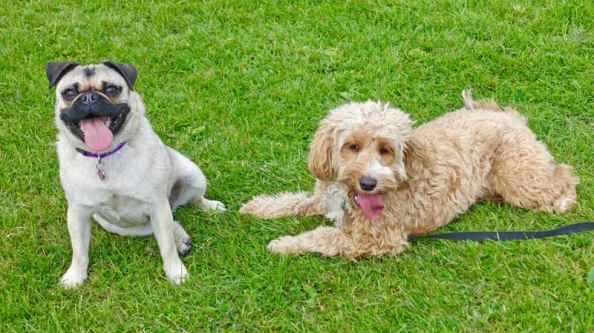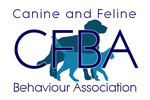Dog Behaviour Consultations by Telephone
Dog Behaviour Consultations by Telephone

Online dog behaviour consultations are individually tailored training sessions delivered from a distance. Dog behaviour consultations by telephone or computer/mobile device enable me to offer you the benefit of my experience, knowledge and qualifications to help you and your dog with practical, personalised training to resolve your dog's behaviour issues. The calls are taken within the comfort of your own home at a mutually convenient time and date.
I have worked as a successful full-time dog behaviour practitioner running my own business (Alpha Dog Behaviour Ltd) for approaching 20 years and have carried out in excess of two thousand consultations covering all aspects of dog behaviour problems across a wide range of dog breeds. I have a Master’s degree in dog behaviour from Middlesex University (Professional Practice in Canine Behaviour and Psychology) and I am a full member of the CFBA, The UK’s leading dog behaviour association. I am also a master trainer with the Guild of Dog Trainers.
I offer the service of *one-hour long telephone or online video calls using services such as Skype, Zoom, Google Hang Out, Facetime or any other method you prefer for dog behaviour consultations. I am flexible with technology and can use whatever method best suits you. Many people can benefit from this service, such as customers living in remote locations, whether based in the UK or abroad. I have provided dog behaviour telephone consultations throughout far-flung corners of the UK, United Arab Emirates and across Europe, It can also suit people with time constraints and offer significant cost savings due to removing the need for the time to travel to you.
*More than one call may be needed to offer you full support through the process.
I also work as a Dog Expert Witness assessing dogs that have either bitten, or alleged to have bitten a person, and I have been called upon to give my professional opinion on legal cases such as neglect, noise nuisance disputes and assessing dogs for adoption and fostering in families. I also work with a variety of dog-related companies to assist them with media campaigns. I am the pet behaviourist to Petplan UK, the UK’s largest and most trusted pet insurance company.
The process for a dog behaviour consultation
You would first complete my contact form providing me with a brief summary of your dog’s history, the detail of his current problems/home setup, and stating that you require a telephone or online consultation. I would then contact you to confirm the cost and agree a time that suits you for the training session. You can pay me via PayPal, or alternatively using online banking.
On the call, I will listen carefully to understand the issues with your dog, ask you some further questions to identify your specific needs and then coach you through practical training methods and techniques to support a desirable outcome for you and your dog. A notable benefit from this remote learning style in that I am not there in person and am therefore able to remotely observe your dog’s behaviour without unduly influencing him with my presence. This can provide me with a better idea of how your dog is relating to you as his owner.
I follow up the consultation with a written plan for you to follow and practice with your dog, reinforcing the techniques learned on the call. Further to the call itself, I remain on hand to receive updates on your dog’s behaviour so that we can make any adjustments necessary.
If you wish, video calls can be recorded at my end of the call and then a video file is created and sent to you so that you can download and watch again at your leisure. This service is at no extra cost to you and to my knowledge is a completely unique dog behaviour service, bringing additional value to you in the process.
Online dog behaviour consultations work well for:
This service is ideal for puppies, whether pre-puppy arrival planning advice or puppy training for once you have your puppy at home. Pre-puppy consultations can address issues such as the choice of breed, how to select a breeder, choosing a puppy from the litter and how to prepare everything you need for your new puppy.
Once you have brought your puppy home you have a wide range of topics to consider:
Socialising your puppy
The subject of socialisation must be the single most important area for you to consider given that in my day-to-day dog behaviour consultations we can usually look back and see weaknesses in the socialisation period. Young dogs that lack adequate levels of control and engage in unwanted behaviours with other dogs and people can lead to experiences that can negatively affect them for long periods and may require lots of time and effort, not to mention the cost to overcome them successfully.
Many people underestimate the pro-active effort that is required to avoid issues with other dogs, people, and certain locations and experiences. Working through this together to establish a sensible plan of action is an investment that will literally last for life.
Toilet training your puppy
Many new owners of puppies believe that if you leave the back door open, a puppy will automatically go to a corner of the garden and do all of his toileting there and not do his business in the home. Whilst puppies do like to toilet in quiet areas, that could quite easily be behind the sofa unless you positively show and reinforce with your puppy where and when you would like it to toilet. Getting it right from the outset and avoiding common problems with toilet training is a far less stressful experience than spending time on teaching your dog all over again from scratch.
Crate training your puppy
Introducing your puppy to a safe and secure dog crate from the outset can offer a multitude of benefits such as the fast-tracking of toilet training at night, offer a fixed location to place your dog for short periods in the day as you carry out chores and provide a location that the dog can retire to when it all gets too much. Dogs are by nature denning animals and provided that the crate is introduced early enough and in a positive manner, there is no reason why your puppy would not want to enter and stay there for sensible periods of time in the day and sleep there at night until you feel he is ready to graduate to a regular bed in a location of your choosing.
Basic puppy obedience training
Knowing how and when to introduce basic dog training methods can greatly enhance your relationship with your dog. The simplest commands such as the Sit, Down, Stand, Stay, Wait and Recall can all be introduced from 8 weeks onwards and they can be naturally progressed as your dog matures with you. By progress I mean the distance, duration and distractions are the three variables that come to mind.
The puppy recall
When out of the home in the garden or local fields with your young dog, the ability to rely on a sound recall will need to be one of your priorities. A dog that reliably returns when called will enable you to allow the dog to be free and to experience the world and all that it has to offer. The world can be highly interesting and distracting to most dogs and your confidence in being able to call your dog away and back to you will be an on-going effort in the first year and beyond.
Puppy biting and chewing
A puppy that is frightening the children, or even the adults in some cases, with excessive behaviours such as puppy biting and nipping, can really take the fun out of the puppy owning experience. This is not to say that your puppy is aggressive, but they can in some cases relate to you as if a littermate whereby the coat and skin are thicker and pain is not felt as you or I might feel it. The basic rule is no teeth on skin or clothing at any time and we can walk through balanced methods on how to create this all free from heavy handling or shouting.
Preventing your puppy from jumping up
Puppies want to be up where the action is and that’s usually your face as you radiate that smile and excitable voice to your pup. Teaching your puppy to sit to receive praise and affection is a skill well worth developing and we can address this together.
Diet and good eating habits
A healthy diet will be the cornerstone of your puppy’s behaviour and physical well-being. Walking through the complex subject of puppy nutrition can help avoid health issues further down the line and ensure that your puppy is fed the correct amounts.
Walking your puppy on the lead
Taking some time to think about how you will introduce a collar and lead and then set about a nice walking position with you will potentially save a great deal of frustration later in life. An older dog that pulls can be a misery to experience, leading to shoulder and back problems for you and curtailed walks for your dog. We’re not doing Crufts obedience, but a dog that can walk nearby is a pleasure to experience.
Travelling with your puppy
Until you’re in a position to consider it, this subject may seem an unlikely one to be on the list. Depending on the breed and the vehicle you have, there are many variations from a practical standpoint on how you might travel with your dog. Your dog must be secure when in transit, so we have this practical issue, as well as taking time to consider how to introduce the experience to your puppy so that your pup feels safe and secure and does not suffer from travel sickness. This video shows me introducing Max to a new car for the first time.
Telephone consultations are also effective for dogs out of the puppyhood stage with behavioural problems such as, but not limited to:
Separation anxiety in dogs
This behaviour usually translates well to online behaviour consultations. I have carried out a number of consultations to address this and they have resolved successfully. Living with a dog of any age that suffers from separation anxiety can be highly stressful for the owners, the dog and in some cases neighbours due to barking or unwanted noise when alone.
Nuisance barking
Click here to read an in-depth article on 'Excessive Barking and Dogs'. Dogs can bark for a variety of reasons such as boredom, anxiety when left alone, being disturbed by outside activity such as dogs and people walking past the home and so on. Dogs can in theory bark at just about anything and so getting to the bottom of why your dog is barking and then, more importantly, figuring out a plan on how to stop it will be the mission here.
Biting and nipping problems with your dog
As we progress past the obvious and relatively easy to subject area of puppy biting, this behaviour can carry on into adolescence and even adulthood if not successfully addressed when the dog is younger. Such behaviour in older dogs can be more of a concern, especially if it is being displayed to strangers in and out of the home. This is usually an area of dog behaviour reserved for one to one visits, but I have had success in addressing lower levels of such behaviour during telephone dog behaviour consultations.
Car travel problems with your dog
I have written an in-depth article on this very subject here. I have had many dog behaviour cases whereby the dog will either not get in the car at all, or alternatively, they will get in, but once in can behave in such a way that gives cause for concern to the owner and other people near the car due to protective behaviours. Not being able to place your dog in the car free from such behaviours can have a great impact on your lifestyle and where you can take your dog as a result. Car travel sickness is another behaviour that can be just as debilitating for all concerned.
Chewing or destructive dog behaviour
Most people I have visited take a certain pride in presenting a nice home and keeping it clean presentable. A dog that is slowly chewing its way through furniture, doors and remote controls can be a drain on the emotions and finances! This can be addressed by taking a complete review of the dog’s access and lifestyle and we will go through this step by step together during the online consultation.
Diet, food and related dog behaviour
This article on 'Dog Food and How it Can Affect Your Dog’s Behaviour' goes into much more detail on this subject. In some cases, older dogs may have spent years on a diet that has been below optimal for the dog’s ability to function well on a physical and mental wellbeing level. A dog that is obese has a range of health implications, let alone the way it might impact on its day-to-day activities. Many unsuspecting owners feed their dog's unwanted additives such as colourings, flavouring and preservatives, that can all greatly influence the areas mentioned above. I shall walk you through your options whilst taking into account your budget and dog’s preferences.
Dogs and digging problems
When your garden begins to look like numerous mortar rounds have exploded, or the muddy racetrack that was once your lawn, you know it’s time to stop and think about the longer-term implications of your dog’s behaviour. It’s not just the cosmetic appearance of your garden, but the mental state your dog can experience when carrying out such activities as they can often be driven by stress and frustration. In any event, we can start to analyse why your dog is doing this and how to stop it in readiness to lay some new grass seed and plants next season. This page on my website looks at this in a little more detail.
Fear of fireworks and your dog
The firework season appears to be extending for longer periods each year due to various cultural celebrations in our cities, let alone the normal firework season that one might usually expect to extend from October to January! For some dogs and their owners, this can be an absolute misery, reducing otherwise stable dogs to emotional wrecks. Taking time to look ahead and to carry out work well in advance of the next season is an excellent investment that can be sensibly addressed during a telephone consultation. This page on my website offers more information on dogs and fireworks.
Dogs that jump up
Exploring ways to stop this unwanted behaviour is of benefit, especially so in larger, older dogs as the impact on others (especially strangers), can be wide-reaching. It’s not just a case of dirty clothes, but possibly scratches, torn clothing, or pushing people over if the dog is big and exuberant enough. The motivation behind your dog jumping should also be examined as this can also have wider implications. I write more on this subject here.
Nervous behaviour, fears and phobias in dogs
A dog that suffers from fears and phobias can be stressful to live with as they are by nature unpredictable and may respond in a wide manner of different ways. Dogs can be nervous in lots of different situations and how the dog responds to the situation often depends on many factors and in certain situations may result in aggressive and defensive responses by the dog leading to further complications as a result. Such behaviours frequently stem from a lack of or negative socialisation experiences. Taking time to break it all down into component parts and to put in its place something calmer and less stressful is what we can do during a call together. More information on this subject can be found here on my website.
Dogs and over excitement with visitors
This subject comes up on a very regular basis on many of my face-to-face behaviour visits, but can also be effectively discussed and addressed during an online consultation together. A highly excitable dog when people come to the home can then go on to carry out any number of other unwanted behaviours such as nipping, damaging items in the home, damaging clothing, submissive urination or even causing aggression from other resident dogs in an effort to calm the situation. I write about this on this page here.
Toilet training problems with your dog
It isn’t just puppies that gain attention for this behaviour problem, or to be more correct, training problem. Most dogs can and will change their ways when you, the owner, spend the time to re-educate them on where and when you would like them to toilet. Rescue dogs can come to you in need of such retraining and all of this is possible should you wish to speak with me on the subject. The subject of toilet training can be read on my website here.
Telephone and online consultations are not a substitute for in-person dog training, and there are some types of dog behaviour problems that are not appropriate for consultations by phone or online, such as dog to people aggression, or dog-to-dog aggression. I will be honest with you if I think that your dog's behaviour problems are not suitable for an online consultation and that I recommend a face-to-face consultation instead. If we go on to hold to a face-to-face dog behaviour visit, then the cost of the consultation would be deducted from that fee.
I look forward to hearing from you and you can complete my enquiry form below.







